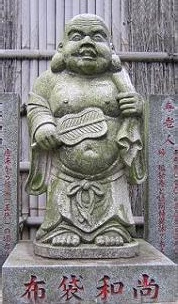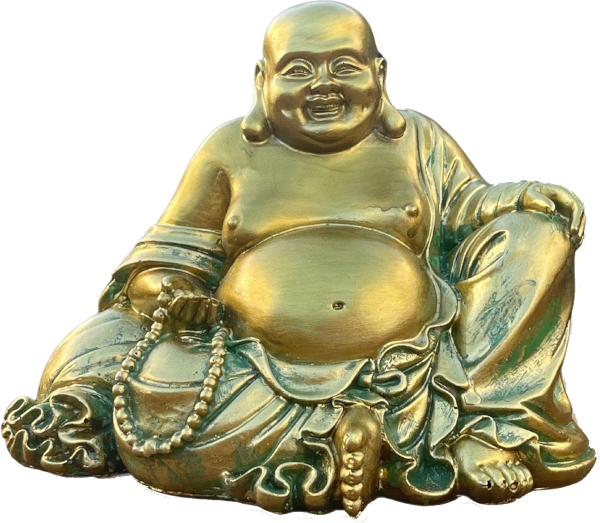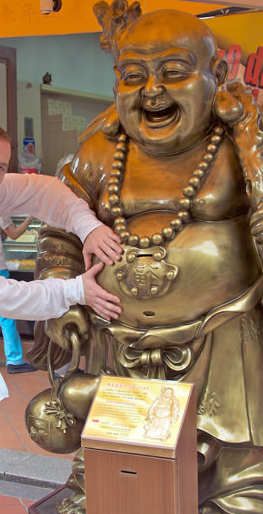Hoteison is one of the deities (fukunokami) of the Seven Lucky Gods of Japan (Shichifukujin); the other six being:

The rotund Hoteison is the only member of the Shichifukujin based on a mortal human; an eccentric 10th century Chinese Zen monk called Kaishi (or Shakukaishi, depending on the Chinese-Japanese interpretation) and named Hotei when he was introduced to Japan as a god in the late Muromachi period, because he always carries a sack.
Hoteison is thought to be the reincarnation of the veritable Maitreya (miroku Bosatsu), a Buddhist saint and Buddha of the Future. He lived in Mingzhou (now Ningbo City, Zhejiang Province, China). Maitreya is reputed to have 100 billion clones.
Hoteison, like Daikokuten, is a god of abundance. He is also the god of laughter and the happiness you can achieve by being satisfied with what you have. He is the god of joy and satisfaction in trade; hence a Hoteison statue is often positioned at the entrance of department stores and shopping malls, though in reality(!) he is a nomadic, wandering and somewhat mendicant monk.
Many Zen-related paintings from the Kamakura period show Hoteison as a laughing man patting his huge belly symbolising nourishment and abundance. He carries a ceremonial fan (ogi) and a large bag of riches, such as rice, over his shoulder.
The supply of rice from his bag is never exhausted so he can afford to be generous; there's always sufficient to feed the hungry. Sometimes he's shown sitting in a cart drawn by a few grateful children who've benefited from Hoteison's altruism, a sort of Buddhist Santa Claus.

Amazon sells (or used to sell) this ornament online for $44.99. It's painted polyresin, 16.5 cm (6.5 inch) high, and comes with the description "Feng Shui decor - rub the Buddha belly to bring good fortune, wealth & prosperity."
It's not, of course a statue of a Buddha; it's a statue of Hoteison, a Buddhist monk. And as for bringing "good fortune, wealth & prosperity", well, the manufacturer and vendor will profit, though Amazon's owner, multi-billionaire Jeff Bezos, probably won't get much wealthier with the sale, and the end purchaser will get nothing. So there's no good fortune, wealth or prosperity for them, whether or not they rub the statue's belly.


Another online product is this ladies' "Rub my belly for good luck" tee-shirt, Buy it and wear it if you wish, but don't expect success in court when you try to claim compensation from a groper.
It's possible that some Chinese restaurants in the West have a Hoteison statue and encourage their customers to rub its belly, but please don't think the practice is acceptable behaviour in Asia. Rubbing the belly of a statue is simply superstition for people who don't understand Buddhism.
In Buddhism, you create and change your own destiny.
Statues of many religious figures, Buddhist, Christian, Hindu, etc, might be rubbed or kissed as a part of sincere worship or reverence, but not just for a photo to upload to your social media account. Doing so only invites scorn at best, and disgust at worst.
What would you gain from rubbing a statue of Hoteison? Well, some of the bacteria from previous rubbers can include pseudomonas and more likely staphylococcus which can cause highly transmittable eye and/or bladder infections, endocarditis, and even sepsis which can kill you. That's not good fortune at all.
Finally, moving away from the pot belly, we look at Hoteison's laughing face. Jolly Santa Claus has a similar laugh, but why? What's so funny?
Well, laughter has been proven to be therapeutic. Religious worship is often pretty staid and their statues often have seriously sad faces, which don't engender joy or pleasure. Both Hoteison and Santa Claus spend all their time and energy giving gifts to people, and giving, as you know, brings as much joy to the giver as to the receiver - indeed, often more joy.
Hoteison's laugh is a constant reminder to smile, stay happy and enjoy life. This positive attitude brings you even more blessings of prosperity.
And as you finish reading this page, please check the funny story about a monk.